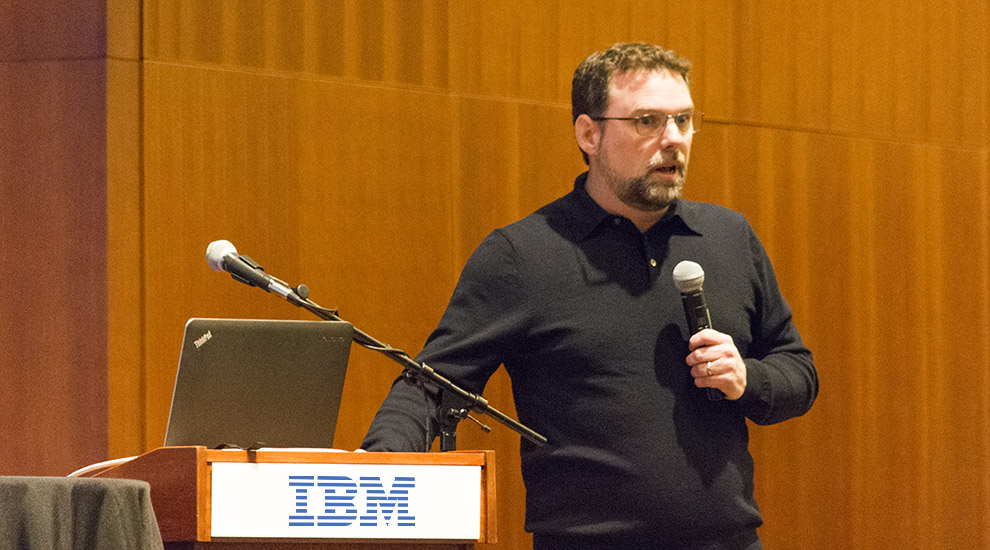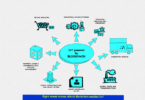The Aite Group projects the blockchain market could be valued at $400 million by 2019. For that reason, some of the biggest names in banking, industry and technology have entered into the space to evaluate how this technology could change the financial world.
IBM and Linux, for instance, have brought together some of the brightest minds in the industry and technology to work on blockchain technology through the Hyperledger Project.
The Hyperledger Project is under the umbrella of the Linux Foundation, and seeks to incorporate findings by blockchain projects such as Blockstream, Ripple, Digital Asset Holdings and others in order to make blockchain technology useful for the world’s biggest corporations. IBM has also contributed its own code to the project.
According to John Wolpert, IBM’s Global Blockchain Offering Director, when IBM and Linux began working together on the blockchain project, Linux made clear it wanted to “disrupt the disruption,” in part with their findings, as well as the data gathered by projects such as Ripple, Ethereum and others exploring the blockchain.
The Linux foundation announced its Hyperledger project on December 17, 2015. Just one day later, 2,300 companies had requested to join. The second-largest open source foundation in the history of open source had only 450 inquiries.
“So, it’s either going to be a holy mess or it’s going to change the world,” Wolpert said at The Blockchain Conference in San Francisco presented by Lighthouse Partners. As Wolford puts it, a team of IBMers is “on a quest” to understand and “do something important” with blockchain technology.
“I don’t know why we got this rap in the ‘70s, way back, that we are not cool, that we’re kind of stodgy, and that is not the IBM of my experience,” Wolpert, who founded the taxi service Flywheel, explained. “We’re the original crazy people. The craziest people are the guys at IBM in the ‘60s and ‘70s — you can imagine what they were doing in the ‘60s — they are wild-eyed revolutionaries.”
Although this is not the image IBM markets, their work in quantum computing, quantum teleportation and neuro semantic chips count among some of the “cool stuff” IBM does, says Wolpert. IBM also approaches projects in the spirit of open innovation, and not proprietarily.
“Our method of operations is open, and it’s often our MO to back not-our-thing,” he said of IBM since the 1990s.
Wolpert cites Java as one such project: “You would not know about Java today if it weren’t for IBM.”
As a “pretty young dude,” Wolpert was in the room when IBM made a billion-dollar decision to back Linux over its own technology. He also cites IBM’s work on XML as an example of IBM’s dedication to open innovation.
Currently, IBM has employees working on crypto-security and distributed systems who have been working on consensus algorithms for their entire careers, some for more than 30 years.
“They’re crazy smart, we’re planetary, we’ve gone from a couple of guys in a canoe, to a platoon and approaching an army of people working on blockchain,” Wolpert said. “So it feels a lot like my first job at IBM which was making Java real for business.”
This has led old and new friends to contact the the multinational technology and consulting corporation.
“Banks who have been calling us constantly … saying ‘What’s your view on blockchain?’ or ‘Hey, let’s do a project together on blockchain,’” Wolpert said. “We’ve been doing all these crazy projects on blockchain, every kind of blockchain, and learning a lot, been doing that for a couple years and really started to accelerate last year.” Today, there is a whole unit dedicated to blockchain technology at Linux Foundation.
“We went all-in on blockchain,” he explained.
What’s it all about for Wolpert? “It’s about evolving the Internet.” Bitcoin is important for moving money around without a single authority.
“[Bitcoin] is a solution to a problem, a specific problem, of people who need to move money around in environments where you don’t trust the government,” Wolpert said. “I think we can all agree we are approaching the end of the era where a single authority manages trust and gets compensated for the risk in doing so.”
In Wolpert’s view, finance does not need to go from today’s system of trust — where consumers trust institutions to handle their money — to one of complete trustlessness, like the Bitcoin system in which a protocol, not a centralized authority, manages the movement of value.
“It doesn’t follow, having one single trust authority to trustlessness on everything,” he said. “There is a false dichotomy between the notion of trust and trustlessness, that you have to have a walled garden on one side and Bitcoin on the other.”
He doesn’t compare Bitcoin to the Internet, saying that’s a wrong analogy.
“It is not apt to say the Internet is like Bitcoin; the Internet is, from the perspective of Bitcoin, a permissioned walled garden,” he said. “Ever heard of ICANN? It’s permissive, but it’s permissioned.”
Bitcoin, Ripple and Ethereum are “Iteration 1” of blockchain technology, the three time IBMer told his audience. Wolpert thinks blockchain technology will soon evolve to “Iteration 2.”
The problem with it?
“The Internet is constrained,” Wolpert said. “You have a fabric that allows for lots of competition on platforms and huge amounts of competition on solutions and applications on top of it, so we need to evolve the Internet to become economically aware, and that Internet isn’t going to be an application, it is going to be a fabric and then lots of applications on top of that.”
This doesn’t mean blockchain 2.0 technologies such as Blockstream, Ethereum and Ripple are lost causes that must now completely retool. The Linux Foundation, in fact, works with Ethereum and Ripple employees. With its blockchain projects, IBM is not focused on moving a cryptocurrency.
“Lots of banks pay us lots of money and we like that, and we want to radically improve them,” Wolpert explained. “[Bankers] are gonna try like heck to radically improve what is going on ahead of the disruption, disrupt themselves if you will. If you look at things like [Overstock’s] t0, that’s happening, might happen on Bitcoin protocol, but might not, and there’s plenty of ways to solve it, when you commit to it. And sure, Bitcoin has woken [banks] up to this, so it’s doing its job, it’s disrupting the thinking and maybe that is all that is necessary.”
Wolpert wonders aloud during his speech if the world would have iTunes were it not for Napster, or Netflix if it weren’t for BitTorrent.
The former head of products for IBM’s Watson Ecosystem says IBM currently has a “boomtown with giant numbers of people at IBM and everywhere else” investigating the blockchain problem and how distributed technology can be made useful for industry.
He details how oftentimes IBM tinkers with open innovations itself to make the technology ready for industry. That’s not the route being taken with Bitcoin. That the Bitcoin network is on par with Irelandfor energy consumption, and that mining consortiums could eventually dictate that market, scares the firm away from dealing directly with Bitcoin.
“What I want to see, what we want to see, is a world full of companies who I can know, who I can identify, who are so spread out, like the Internet,” he said. Wolpert cites the Arab Spring, and the role the Internet played in that uprising, as how a permissioned, yet permissive, structure functions. Websites, albeit technology permissioned by ICANN, remained online during the protests and played a major role.
What’s the risk in experimenting with blockchain?
“The risk is we go crazy, we have an unruly mess,” Wolpert warned. “[But] it’s the Linux Foundation, we’ve been in this movie before. While there’s a lot of really smart guys working on Bitcoin and startups, we’ve got equally amount of people who also have 20 or 30 years of experience with open source and open innovation, and I think we have a good shot at maintaining restraints, keeping it scoped down, keeping it simple, but getting it to something that is useful.”
Click on the bitcoin logo below to buy, use or accept bitcoin. Unocoin is India’s most popular bitcoin wallet.
To read the bitcoin white paper, visit: https://bitcoin.org/bitcoin.pdf








